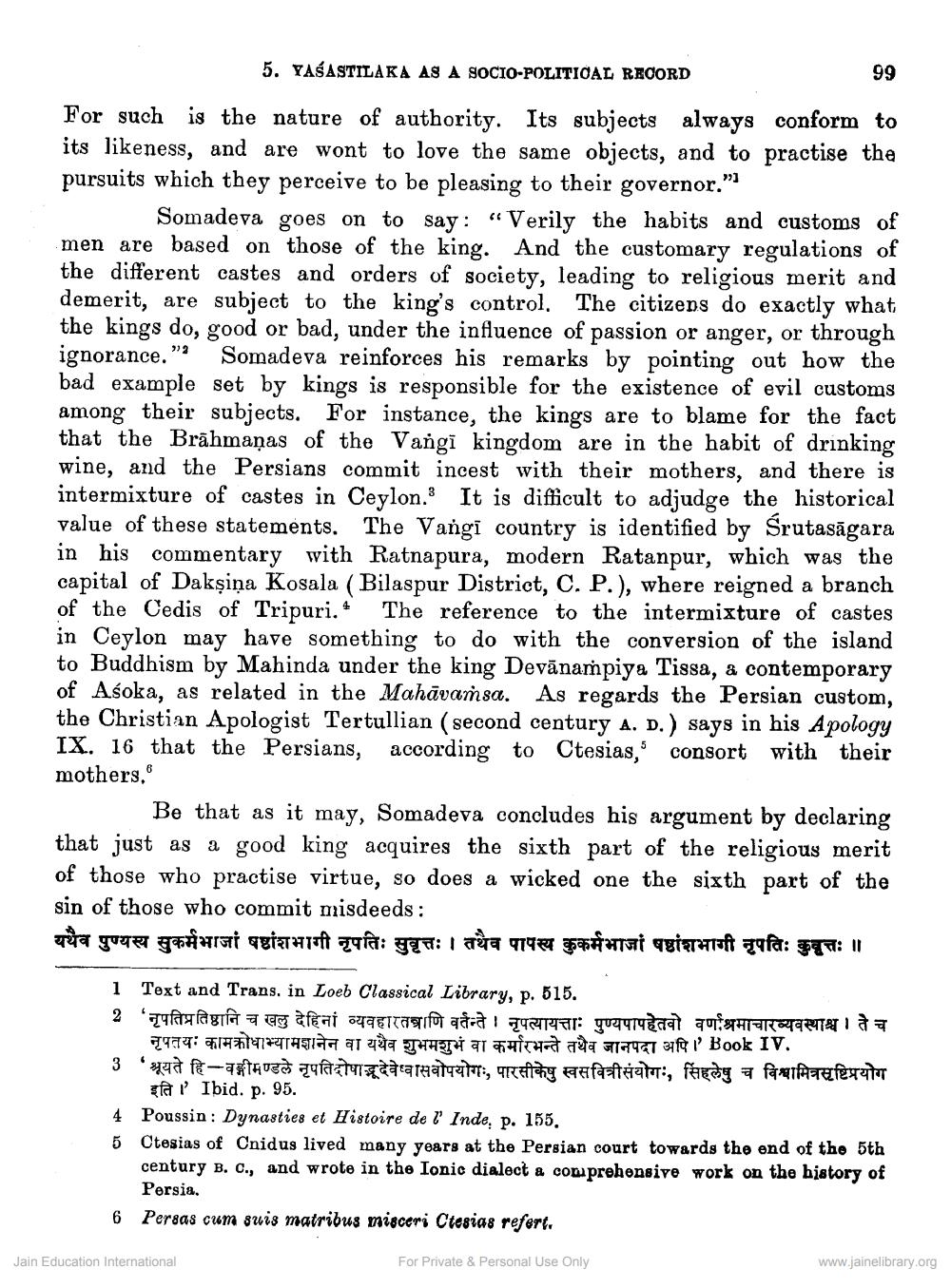________________
5. YAŠASTILAKA AS A SOCIO-POLITICAL RECORD
For such is the nature of authority. Its subjects always conform to its likeness, and are wont to love the same objects, and to practise the pursuits which they perceive to be pleasing to their governor."
Somadeva goes on to say: “Verily the habits and customs of men are based on those of the king. And the customary regulations of the different castes and orders of society, leading to religious merit and demerit, are subject to the king's control. The citizens do exactly what the kings do, good or bad, under the influence of passion or anger, or through ignorance.” Somadeva reinforces his remarks by pointing out how the bad example set by kings is responsible for the existence of evil customs among their subjects. For instance, the kings are to blame for the fact that the Brāhmaṇas of the Vangi kingdom are in the habit of drinking wine, and the Persians commit incest with their mothers, and there is intermixture of castes in Ceylon. It is difficult to adjudge the historical value of these statements. The Vangi country is identified by Śrutasāgara in his commentary with Ratnapura, modern Ratanpur, which was the capital of Dakşiņa Kosala (Bilaspur District, C. P.), where reigned a branch of the Cedis of Tripuri.* The reference to the intermixture of castes in Ceylon may have something to do with the conversion of the island to Buddhism by Mahinda under the king Devānampiya Tissa, & contemporary of Asoka, as related in the Mahāvaṁsa. As regards the Persian custom, the Christian Apologist Tertullian (second century A. D.) says in his Apology IX. 16 that the Persians, according to Ctesias, consort with their mothers.
Be that as it may, Somadeva concludes his argument by declaring that just as a good king acquires the sixth part of the religious merit of those who practise virtue, so does a wicked one the sixth part of the sin of those who commit misdeeds : यथैव पुण्यस्य सुकर्मभाजां षष्ठांशभागी नृपतिः सुवृत्तः । तथैव पापस्य कुकर्मभाजां षष्ठांशभागी नृपतिः कुवृत्तः ॥
1 Text and Trans, in Loeb Classical Library, p. 515. 2 'नृपतिप्रतिष्ठानि च खलु देहिनां व्यवहारतत्राणि वर्तन्ते । नृपत्यायत्ताः पुण्यपापहेतवो वर्णाश्रमाचारव्यवस्थाश्च । ते च
1974: 114772ANa ar 29 THAT IT ufunda 517437 311 Book IV. 3 'श्रूयते हि-वङ्गीमण्डले नृपतिदोषाद्भूदेवेष्वासवोपयोगः, पारसीकेषु स्वसवित्रीसंयोगः, सिंहलेषु च विश्वामित्रसृष्टिप्रयोग
sfati' Ibid. p. 95. 4 Poussin: Dynasties et Histoire de l'Inde, p. 155. 5 Ctesias of Cnidus lived many years at the Persian court towards the end of the 5th
century B. C., and wrote in the Ionic dialect a comprehensive work on the history of
Persia. 6 Persas cum suis matribus misceri Ctesias refert.
Jain Education International
For Private & Personal Use Only
www.jainelibrary.org




